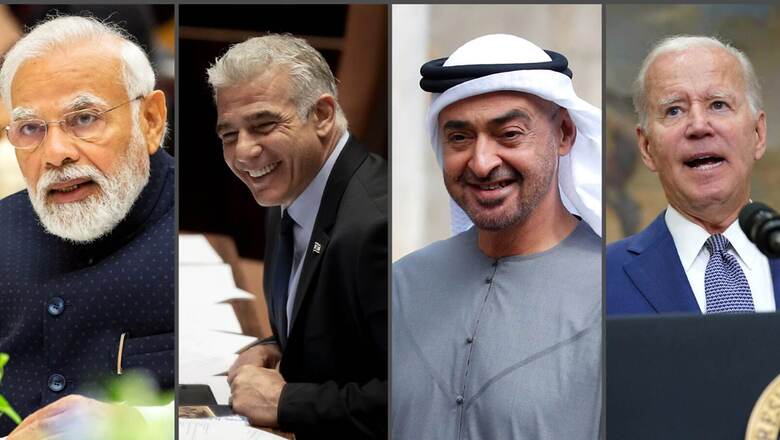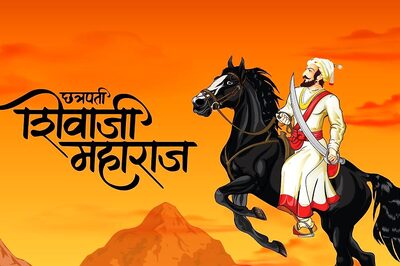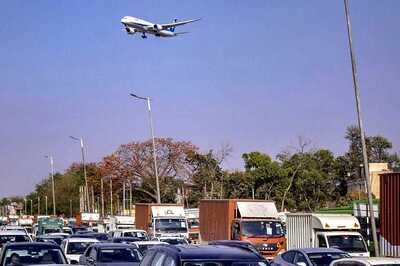
views
Prime Minister Narendra Modi joined US President Joe Biden, Israeli PM Yair Lapid and UAE President Mohammed bin Zayed Al Nahyan at the first-ever summit of ‘I2U2’ on 14 July 2022. The four-nation grouping is known as ‘I2U2’, with “I” standing for India and Israel and “U” for the US and the UAE. Popularly known as the ‘Middle East Quad’ (or ‘West Asia Quad’) in International discourse, the grouping is aimed at promoting joint investments in six mutually identified areas of water, energy, transportation, space, health, and food security.
PM Modi hailed the four-nation grouping for setting a positive agenda and providing a practical model for cooperation in the face of global uncertainties. The Prime Minister noted that the grouping would contribute to energy security, food security, and economic growth — areas crucial for India amidst this changing geopolitical order.
What is I2U2?
First mooted as the “International Forum for Economic Cooperation” during the foreign ministers’ meet of the four countries held in October 2021, the grouping is intended to aid in modernising the infrastructure, promoting low-carbon development pathways for industries, promoting public health, and developing green technologies. Thus, I2U2 is not a new formation, but rather a formalisation of the already existing strategic cooperation between the countries, which is aimed at developing a framework that allows both regions to serve each other’s economic security more effectively.
Also, it is widely acknowledged that what kick-started the formation of this grouping was the Abraham Accords, signed a year prior to the group’s first meeting and played a crucial role in the normalisation of Arab-Israel ties.
Can it be called ‘West Asian Quad?
The I2U2 has been referred to as the ‘West Asian Quad’ on the lines of the Quadrilateral Security Dialogue (Quad) which has Australia, India, Japan and the US as members. According to analysts, the newly formed alliance will boost US efforts to contain Chinese influence in Asia and the Middle East. However, the parallels drawn are questionable given the differing foreign policy stances witnessed with respect to Russia. Barring the US, no other country in the I2U2 — Israel, India, or the UAE — has followed the Western lead of imposing sanctions on Russia. Furthermore, while the Indo-Pacific Quad was primarily focused on defence and security, the West Asia Quad seems to focus more on economic cooperation, and not security cooperation.
Even on the issue of China, the grouping doesn’t seem to have converging interests. The UAE is already a signatory to China’s Belt and Road Initiative (BRI) and Israel is expected to gain from the initiative due to its strategic geographical positioning as a transit country, connecting Europe, Asia and Africa. The BRI gives greater scope and reach to Israeli technology, and it also helps in boosting tourism. Maybe this is why, while Beijing has often attacked the Indo-Pacific Quad grouping as ‘Asian NATO’, it has avoided being overly critical of the I2U2 yet.
What does India stand to gain?
According to a former Israeli national security adviser, the I2U2 Summit’s first high-level meeting is a significant development in which India’s partnership can prove to be a “game changer”. Additionally, American National Security Advisor Jacob Sullivan noted that just as the United States can play an important role in deepening Israel’s integration into the region, India has a role to play as well. The US State Department spokesperson, Ned Price, noted that since India is a massive market and a producer of high-tech and highly sought-after goods as well, the four countries can work together on several areas, including technology, trade, climate, and Covid-19. He also hinted that security cooperation might be possible in the future.
Since India enjoys friendly relations with the countries in the region, as well as deep cultural and historical links and vibrant economic ties, it can be called a ‘natural partner’ for the US in its efforts to revitalise its alliances in the region. India has a decent presence in the region as it is a major buyer of energy from the region, and also a major supplier of many consumer goods and human resources to the West Asian region. For the UAE, apart from being an oil importer, India, owing to its massive IT industries, is a source of diversification and modernisation. On a similar note, Indo-Israeli relations are flourishing currently with defence relations being the underpinning of this growing strategic convergence.
Having discussed why India is a crucial player in the grouping, it’s imperative we discuss what India stands to gain from this newly formed alliance.
New Delhi considers the Western Indian Ocean region as an area of geopolitical interest, given the critical SLOCs that pass through the area, and also the presence of key geographical chokepoints like the Suez Canal and Bab-el-Mandeb. Thus, a regional grouping like I2U2 brings with it an abundance of opportunities.
The grouping helps India in positioning itself as a reliable, strategic and developmental partner in the West Asian region. The current administration has succeeded in strengthening ties with major countries in the region like the UAE, Saudi Arabia, and Qatar, successfully forging ties in various sectors including energy, trade, investment, counterterrorism, and defence cooperation. The I2U2 can provide India with an excellent foothold for an even greater role in West Asia. It can lead to the emergence of a stronger and more multifaceted strategic partnership between India and 12 West Asian countries.
An analysis of the joint statement from the first summit demonstrates the grouping’s resolve to address the various areas that are crucial not just for India but the larger Global South. With a focus on the food security crisis and clean energy, the grouping has announced a 300 megawatt (MW) hybrid renewable energy project in Gujarat, supplemented by a battery energy storage system. The energy project will also include greater opportunities for public-private sector cooperation. The joint statement notes that the project has the potential to make India a global hub for alternate supply chains in the renewable energy sector.
Another initiative announced in India pertains to food security. A series of integrated food parks will be developed across India with $2 billion in UAE funding that will incorporate state-of-the-art climate-smart technologies to reduce food waste and spoilage and conserve fresh water. The recently announced initiative will bring a big technological boost, help maximise crop yields, tackle food insecurity, and enhance our capabilities even further. India already has a ‘Mega Food Park’ Scheme in place since 2008, and the recently announced initiative will help maximize crop yields, tackle food insecurity, and enhance our capabilities further.
Conclusion
Since the turn of the millennium, Gulf countries and India have witnessed an extraordinary turnaround in their relationship. Because of India’s diaspora presence and its “Look West” policy of intensifying already flourishing relations with major powers in the Middle East, New Delhi holds a deep strategic relationship with the region.
I2U2 is an ideal example of how ‘minilaterals’ can reshape West Asia’s geopolitical landscape, enabling India to establish both economic relations and long-term security cooperation through a comprehensive engagement strategy. In recent years, India’s footprint in the region has grown substantially, making the I2U2 alliance a natural next step for India to further consolidate those ties.
Read all the Latest News, Breaking News, watch Top Videos and Live TV here.




















Comments
0 comment